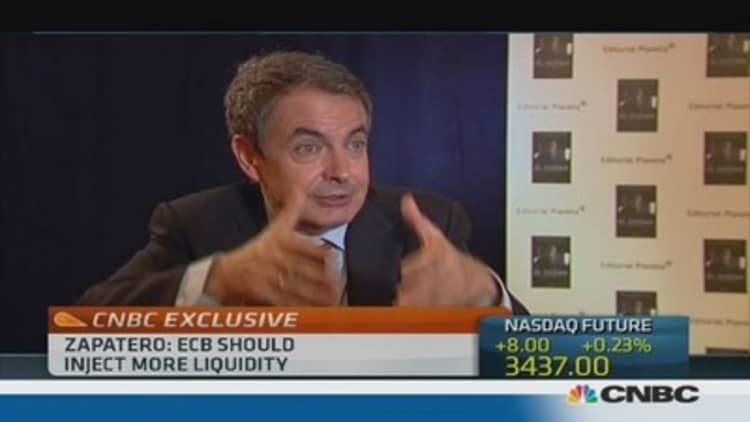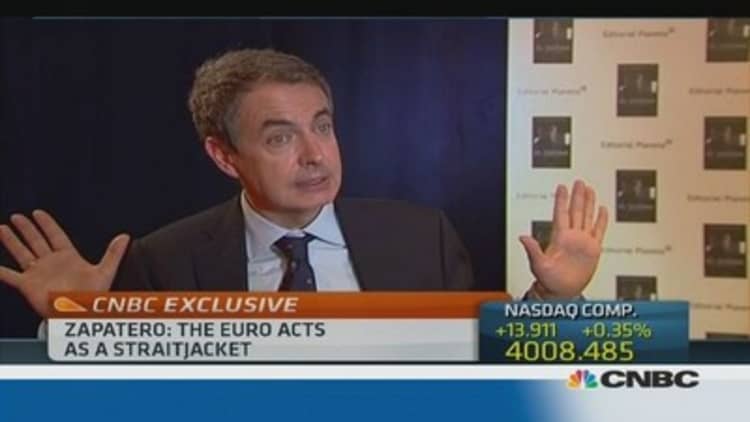
Former Spanish Prime Minister Jose Luis Rodriguez Zapatero has said the problem with the euro zone is that its monetary policy pre-crisis was designed to aid Germany, rather than other countries like Spain.
Zapatero, who served as prime minister between 2004 and 2011, told CNBC that the loose monetary policy pursued by the European Central Bank (ECB) helped overheat Spain's housing market, leading to its crash in 2008. The subsequent hit to Spain's banking sector saw the government accept 41 billion euros ($56 billion) of aid to rescue its banks, although it avoided a wider sovereign bailout.
"The monetary policy of low interest rates - followed since the birth of the euro right up till the crisis - was designed for the German reconstruction. But what effects did it have for countries like Spain? It created a huge expansion of credit… which created bubbles," said Zapatero, who led the Spanish Socialist Workers' Party (PSOE), in an exclusive interview with CNBC.
(Read more: After Bill Gates, is Spain back in fashion?)
He argued that loose ECB interest rates pre-crisis helped boost demand for German products, and allowed the country to build a large trade surplus.
"Germany had a strong production and a very small domestic demand. It couldn't sell its own products… Spain was buying them, thanks to credit… that the Germans were financing," said Zapatero. He did not run for re-election in 2011, which saw the PSOE defeated and the current premier Mariano Rajoy come to power.
"That was the model. We all agreed on it when the euro was created, and these were the conditions that Germany imposed," he added.
He added that if the Germans wanted the euro zone to now recover, more expansionary policy was needed from the ECB, as well as fiscal reforms.
"The euro has to end up being, in my opinion, a currency with its pillars: fiscal policy, fiscal union,banking union, treasury union and Eurobonds," Zapatero said. "Germany says 'no' to Eurobonds, but I think that what they actually mean is 'no' to Eurobonds for now. I believe that at some point we will have to have debt mutualization. Without that, it will be very difficult for the euro zone to be a source of unity, of growth and stability."
(Read more: )
Merkel's ambush?
Zapatero spoke to CNBC following the launch of his memoir "El Dilema" (The Dilemma). He was the first major European political leader to publish a personal account of the euro zone crisis.
Initial extracts from Zapatero's memoir "El Dilema" were released to Reuters yesterday, and detailed how German Chancellor Angela Merkel "tried to bounce" Zapatero into taking a bailout from the IMF (International Monetary Fund) in 2011.
In the interview with CNBC, Zapatero downplayed the idea that Merkel tried to force him into a bailout, saying that she was a "much nicer in person than you'd expect."
"At the G-20 meeting (in Cannes in November 2011), it wasn't an ambush. It was quite spontaneous," Zapatero said. "We were facing huge turmoil in the financial markets, with very high risk premiums, especially on Italy and Spain. She was trying with all the world leaders to find an exit; to provide an answer. Don't forget that all this took place in the presence of the U.S. President, who was also affected by this situation. If the euro zone was to fail, again, it would have impacted the world's economy."
Zapatero said he had felt it important for Spain to avoid an IMF bailout, stating that all countries which requested them faced institutional instability, including government reshuffles that resulted, in some cases, in technocratic governments.
(Read more: Spain emerges from 2-year recession)

Earlier this month, official statistics for Spain showed the country was on track to meet its 2013 public deficit target. The deficit stood at 4.8 percent of gross domestic product (GDP) at the end of September, unchanged from August and well below its full-year target of 6.5 percent.
Furthermore, back in October, preliminary data from Spain's statistics agency showed the country's economy grew 0.1 percent in the third quarter, marking a huge turning point for the Spanish after eight consecutive quarters of contraction.
Asked by CNBC whether he felt the economy was rebounding at last, Zapatero said that Spanish society had made a tremendous effort and huge sacrifices to implement the reforms necessary.
"If we want to exit the crisis, we need, above all things, more efforts from the ECB," he added. "This is a crisis of liquidity, from the very beginning, and it is still continuing. Liquidity, which in some cases, led to a solvency crisis in the long-term. The liquidity crisis can only by resolved with liquidity and that is above all, monetary policy."

